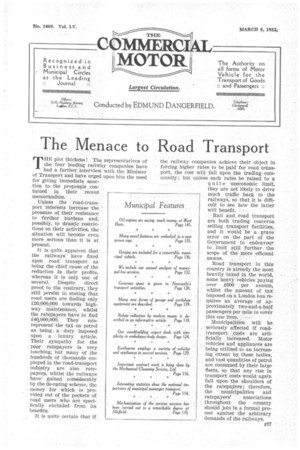The Menace to Road Transport
Page 75

If you've noticed an error in this article please click here to report it so we can fix it.
. THE plot thickens ! The representatives of the four leading railway companies have had a further interview with the Minister of Transport and have urged upon him the need for giving immediate sane tion to the proposals con tained in their recent memorandum.
Unless the road-transport interests increase the pressure of their resistance to further burdens and, possibly, to drastic restrictions on their activities, the situation will become even more serious than it is at present.
It is quite apparent that the railways have fixed upon road transport as being the chief cause of the reduction in their profits, whereas it is only, one of several. Despite direct proof to the contrary, they still persist in stating that road users are finding only £20,000,000 towards highway maintenance, whilst the ratepayers have to find £40.,000,000. They misrepresent the tax on petrol as being , a duty imposed upon a luxury article. Their sympathy for the poor ratepayers is very touching, but many of the ' hundreds of thousands employed in the road-transport • • industry are also ratepayers, whilst the railways have gained considerably by the de-rating scheme, the money for which is provided out of the pockets of • road users who are specifically, excluded from its benefits.
; It is quite certain that if the railway companies achieve their object in forcing higher rates to be paid for road transport, the cost will fall upon the trading corninanity; but unless such rates be raised to a quite uneconomic limit, they are not likely to drive much traffic back to the railways, so that it is difficult to see how the latter will benefit.
Rail and road transport are both trading concerns selling transport facilities, and it would be a grave error on the part of the Government to endeavour to limit still further the scope of the more efficient means.
Road transport in this country is already the most heavily taxed in the world, some heavy vehicles paying over £600 per annum, whilst the amount of tax imposed on a London bus requires an average of approximately two-and-a-half passengers per mile to cover this one item.
Municipalities will be seriously affected if roadtransport costs are artificially increased. Motor vehicles and appliances are being utilized to an increasing 'extent by these bodies, and vast quantities of petrol are consumed by their large fleets, so that any rise in transport costs would again fall upon the shoulders of the ratepayers; therefore, the municipalities and ratepayers' associations throughout the country should join in a formal protest against the arbitrary demands of the railways.












































































































































































